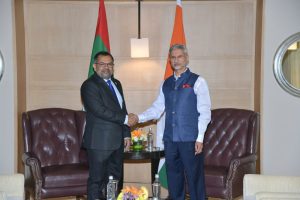Maldives Foreign Minister Moosa Zameer tried to clear the air and reset diplomatic ties with India during his visit to New Delhi on May 8-10.
In conciliatory statements after official talks with his Indian counterpart, S. Jaishankar, Zameer downplayed sources of tension and sought to assuage concerns over the perceived pro-China tilt of the Mohamed Muizzu government that took office in Maldives in November.
Talks with the Indian External Affairs Minister S. Jaishankar took place on May 9, a day before the deadline issued by Muizzu for the withdrawal of Indian military personnel from the Maldives. As agreed by both sides, Indian soldiers stationed across the country to operate two helicopters and a Dornier aircraft for medical evacuations and search and rescue missions were replaced with civilians.
On May 10, the Maldives government celebrated the completed drawdown of the Indian military personnel as a fulfillment of Muizzu’s main campaign pledge, the central pillar of his nationalist appeal for a mandate from voters to end the much-maligned foreign military presence.
Briefing the press back in the capital Malé on Saturday, Zameer said the last batch from a total of 76 Indian soldiers departed on May 9. An equal number of civilian employees of the Hindustan Aeronautics Ltd., the Indian company that manufactured the helicopters have taken their place, he said.
Defending the troop replacement, Defense Minister Ghassan Maumoon said the Maldives has regained “full sovereign command and control” as the civilian personnel would be unable to fly the aircraft without authorization.
“During the past five years when I worked in Parliament, the [national security oversight] committee looked into a flight undertaken without permission from Maldivians. A helicopter was flown then without permission from Maldivians,” the former lawmaker revealed, referring to a previously undisclosed incident.
Pressed for details at the press conference, the army chief confirmed the unauthorized landing of a helicopter on Thimarafushi island during the previous administration. But he declined to provide any further information.
As for Indian army doctors who have been working on a rotational basis at the Senahiya military hospital in Malé since September 2012, “the government does not see the need” to seek their removal, Foreign Minister Zameer said.
During his Delhi trip, Zameer told Indian media that longstanding India-Maldives defense cooperation “goes beyond military personnel.” He said that India is the only country apart from the United States with which the Maldives has joint military exercises, drawing attention to the biennial “Dosti” trilateral Coast Guard exercise with India and Sri Lanka in the Maldives in late February.
The “sensitive issue” of Indian boots on the ground was “taken care of” after Muizzu met Indian Prime Minister Narendra Modi in Dubai late last year. “So we have actually moved beyond that. So that part is over,” he stressed, appearing to dismiss previous allegations of Indian bullying and meddling in domestic affairs as campaign rhetoric.
Zameer firmly assured commitment to working with India to maintain “peace and security of the Indian Ocean.”
A Chinese vessel that docked in Malé in February “didn’t come for research in Maldivian waters,” he said and flatly denied any military pact with China despite an agreement for supply of non-lethal equipment.
He also addressed the break from tradition by Muizzu not making India his first port of call after being elected in favor of Turkey and China.
“We did discuss with Delhi about a visit but for the convenience of both sides we thought it might be okay for us to delay it a little bit,” he said, adding that Muizzu would visit Delhi, “very soon hopefully.”
On derogatory remarks made by three deputy ministers against the Indian prime minister, Zameer said it “shouldn’t have been done and we are taking proper action to make sure that this doesn’t repeat,” referring to the officials who remain suspended with pay, and suggesting that the “misunderstanding” was largely confined to social media.
But a campaign to boycott the Maldives sparked by the incident has made a “dent” in tourist arrivals, he conceded. The steady upward trajectory of India as a top source market has sharply reversed since then with the number of Indian holidaymakers down 42 percent by the end of April.
Zameer’s visit, which the Maldives foreign ministry hailed as “a new initiative of collaboration, symbolizing enduring friendship and shared goals,” was his maiden official bilateral visit as foreign minister and the first visit to India by a senior official of the Muizzu administration.
Meanwhile, there are matters of more urgent concern for the Maldives, concerning debt relief and ongoing India-funded infrastructure projects. Asked by local media on his return to Maldives, Zameer confirmed a request to India to postpone repayment of $150 million owed from $200 million secured as budget support in 2019.
In one-on-one talks, Jaishankar indicated a “green light” for rolling over debt, the Maldives foreign minister revealed, lamenting a twofold growth of debt under the previous administration.
Contrary to appearances on social media, “there is no animosity between our two governments,” and “no doubt whatsoever” about continued Indian assistance, Zameer declared, lauding India as the historically closest and most indispensable partner.
“God willing, we will not shape government policies in a way that would weaken this relationship,” he said.

































